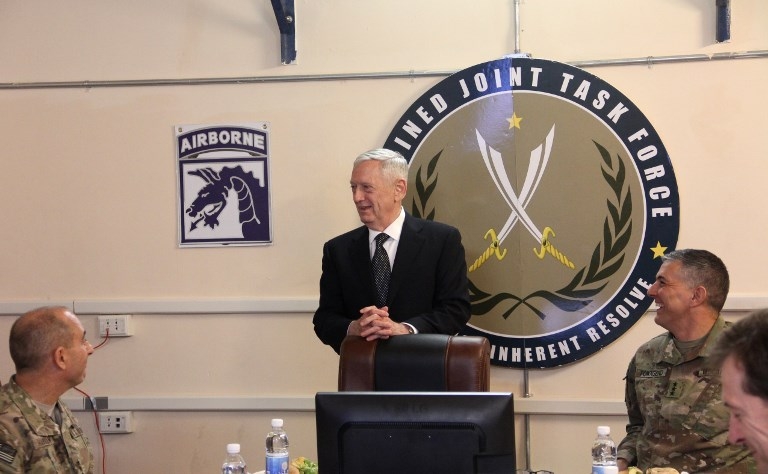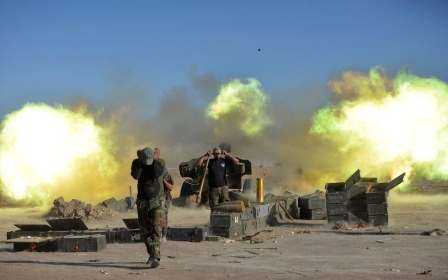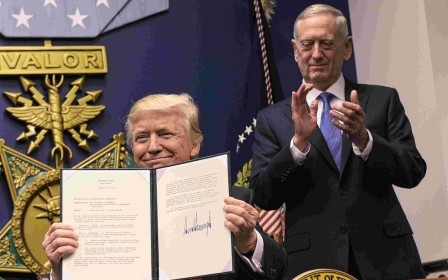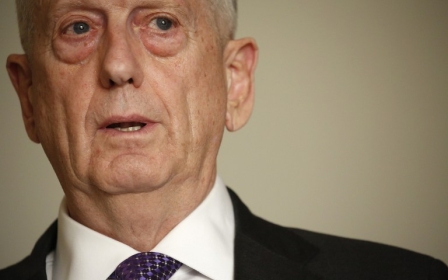Pentagon chief in Baghdad to discuss future of US forces in Iraq

Pentagon chief Jim Mattis was in Baghdad Tuesday to show US support for Iraqi forces as they pressed an assault on Tal Afar, the Islamic State group's (IS) last major bastion in the country's north.
US officials, speaking on the condition of anonymity, said Mattis, who will meet Abadi and Defense Minister Arfan al-Hayali, would discuss the future of US forces in Iraq after the fall of the remaining cities under IS and the role they could play in stabilizing operations.
He will also meet Massud Barzani, president of the Iraqi Kurdistan region, to discuss the upcoming Kurdish referendum and press that he wants to help keep the regime focused on eradicating IS.
"Right now our focus is on defeating ISIS inside Iraq, restoring Iraqi sovereignty and territorial integrity," Mattis told journalists ahead of his trip to Baghdad, using an alternative acronym for IS.
Iraqi troops, supported by the forces of a US-led international coalition, routed IS in Mosul in July after a gruelling nine-month fight for Iraq's second city.
On Sunday they launched an assault on Tal Afar, once a key IS supply hub between Mosul - around 70km to the east - and the Syrian border.
In the desert plains around Tal Afar, convoys of tanks and armoured vehicles could be seen heading Monday for the IS-held city, raising huge clouds of dust.
Mattis would not make any predictions on the fight.
"IS's days are certainly numbered, but it's not over yet and it's not going to be over anytime soon," said the US defence secretary.
Iraqi forces "fought like the dickens in Mosul, (it) cost them over 6,000 wounded, somewhere over 1,200 killed," he noted.
Yet that comeback restored the confidence of the Iraqi security forces after their shock loss of Mosul to IS in 2014.
Mattis stressed that retaking Mosul would not have happened "without... Abadi's steady hand reconstituting that army, that was so shattered in 2014, an army he inherited."
But the comeback also leaned crucially on extensive training, planning and firepower support from the US military.
The future of that support still must be settled, and there will be resistance from Shiite militia and Iranians, said Nicholas Heras, Middle East Security Fellow at the Center for a New American Security in Washington.
Kurdistan referendum challenge
Mattis said discussions will focus on the way ahead, including how to keep Iraq from again politically fragmenting or falling further under Iran's influence, after four years united around battling the the militants.
"Secretary Mattis is going to be very much focused on a pathway for the United States to continue to have to a residual force in Iraq to continue to train Iraqi security forces" and avoiding a successor from IS rising up, said Heras.
A key issue is Iraqi Kurdistan's plan for an independence referendum on September 25, strongly opposed by the US as an event that could undermine Abadi politically and distract from the fight against IS.
"A referendum at this time would be potentially catastrophic to the counter-ISIS campaign," said Brett McGurk, the White House envoy to the anti-IS coalition.
"It's not just the United States; every member of our coalition believes that now is not the time to hold this referendum."
McGurk said the initial push on the outskirts of Tal Afar was "going well", with 235km cleared in the first 24 hours.
"That will be a very difficult battle," he said, but added that Iraqi and US forces are "moving faster, more effectively, more efficiently," in part due to US President Donald Trump having given Mattis more authority to decide on tactics and resources needed.
Mattis, who is on a five-day swing through Jordan, Iraq, Turkey and Ukraine, said he would also talk about reconstruction and resettlement of hundreds of thousand of Iraqis driven from their homes and towns by the fighting, especially Mosul.
"It's not going to happen overnight. It's going to be a heavy lift for them going forward."
But Heras said Mattis, whom he said has earned firm trust among Iraqis, needs to help Abadi further build his power as a moderate for the post-war, with elections looming for next year.
"That will be a political pickle that Mattis will have to work Abadi through," he said.
For Mattis's meeting with Barzani, Heras added: "All signs point to it being one of those tough-love talks."
New MEE newsletter: Jerusalem Dispatch
Sign up to get the latest insights and analysis on Israel-Palestine, alongside Turkey Unpacked and other MEE newsletters
Middle East Eye delivers independent and unrivalled coverage and analysis of the Middle East, North Africa and beyond. To learn more about republishing this content and the associated fees, please fill out this form. More about MEE can be found here.




